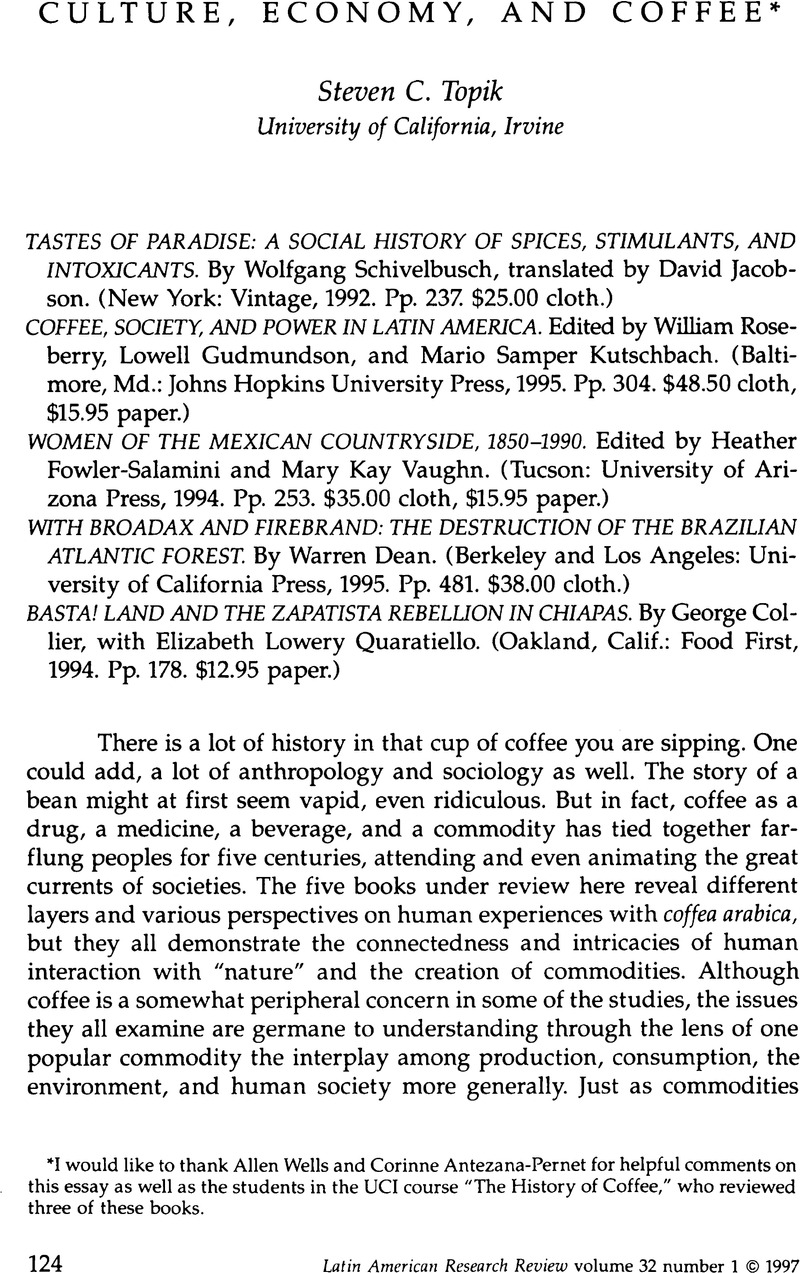Article contents
Culture, Economy, and Coffee
Review products
Published online by Cambridge University Press: 05 October 2022
Abstract

- Type
- Review Essays
- Information
- Copyright
- Copyright © 1997 by the University of Texas Press
Footnotes
I would like to thank Allen Wells and Corinne Antezana-Pernet for helpful comments on this essay as well as the students in the UCI course “The History of Coffee,” who reviewed three of these books.
References
Notes
1. An ambitious anthropological attempt to examine this insight is The Social Life of Things: Commodities in Cultural Perspective, edited by Arjun Appadurai (Cambridge: Cambridge University Press, 1986). See also the excellent review essay by James Ferguson, “Cultural Exchange: New Developments in the Anthropology of Commodities,” Cultural Anthropology 3, no. 4 (1988):488–513.
2. Two of the best and most influential recent cultural histories that demonstrate the emphasis on the political are Everyday Forms of State Formation, edited by Gilbert M. Joseph and Daniel Nugent (Durham, N.C.: Duke University Press, 1994); and Rituals of Rule, Rituals of Resistance, edited by William H. Beezley, Cheryl English Martin, and William E. French (Wilmington, Del.: Scholarly Resources, 1994).
3. A recent study that also stresses diversity but integrates it more successfully into an overall thesis on the relationship of coffee export economies and state-building in Central America is Robert G. Williams, States and Social Evolution (Chapel Hill: University of North Carolina Press, 1994).
4. Karl Marx, Grundrisse (New York: Vintage Books, 1973), 99. Sidney Mintz's study of sugar may come closest to accomplishing this task for an international commodity. See Mintz, Sweetness and Power: The Place of Sugar in Modern History (New York: Viking, 1985). William Cronon expertly combines the stories of production, distribution, and consumption in Nature's Metropolis: Chicago and the Great West (New York: Norton, 1991).
5. Mauricio Font, Coffee, Contention, and Change (London: Basil Blackwell, 1990).
6. McCreery develops this theme much more fully in his recently published book, Rural Guatemala, 1760–1940 (Stanford, Calif.: Stanford University Press, 1994).
7. Albert Hirschman, “A Generalized Linkage Approach to Development, with Special Reference to Staples,” Economic Development and Cultural Change 25, supplement (1977):67–98.
8. Probably the best gendered study of these heterogeneous class positions in the countryside is Carmen Diana Deere, Households and Class Relations, Peasants, and Landlords in Northern Peru (Berkeley and Los Angeles: University of California Press, 1990).
- 2
- Cited by


